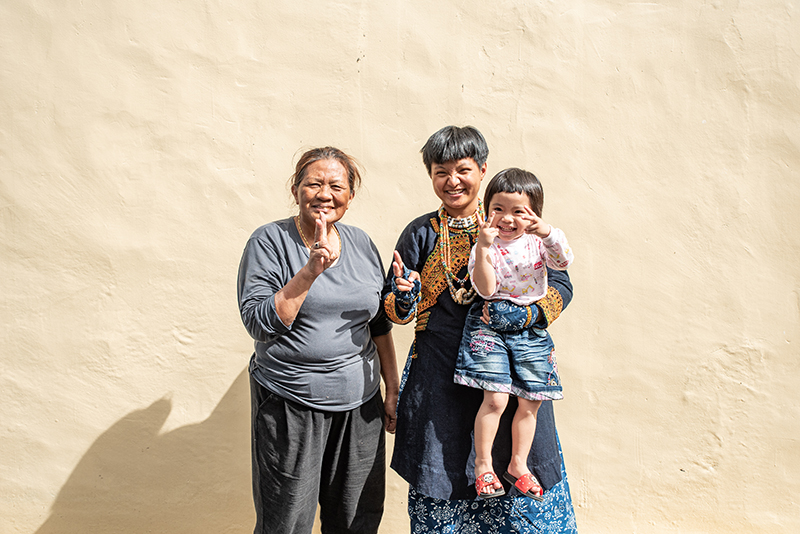

“I hope to pass it along. I will never lose the ancestral heritage to ignorance.”
In the army, Muakayi Ladan is a soldier in camouflage, while back in the community, she becomes a Paiwan pulingau in the traditional attire, serving to transmit the message of ancestral spirits. Having just turned nineteen this year, she is taking up the duty of preserving the traditional practices and culture of her community.
Shaking the mulberry leaves in her hand and chanting the tjatjulatan (“scriptures”), the pulingau is praying to ancestral spirits to bless the community. In the early Paiwan society, pulingaus were seen on many occasions satisfying various needs of community members, from hosting rituals to healing the sick, alleviating disaster, warding off danger, and soothing the spirits. Consequently, they could be fittingly described as the guardians of the Paiwan people’s physical, mental, and spiritual life.
Muakayi Ladan was born in the leading clan of Tjuabar Community. Since elementary school, she has developed a keen interest in watching pulingaus performing rituals. This is because her grandmother, who used to serve as the community leader, was often required to organize weddings and funerals for community members. Apart from seeing pulingaus at home, what impressed her most was the purification ritual during the yearly masalut. Only after being purified were the family members allowed to go out and collect offerings from other relatives. Every time as she listened to pulingaus chanting the ancient scriptures, the small Muakayi could not help but feel shocked and moved by their state of multiple identities in delivering the will of sacred spirits.
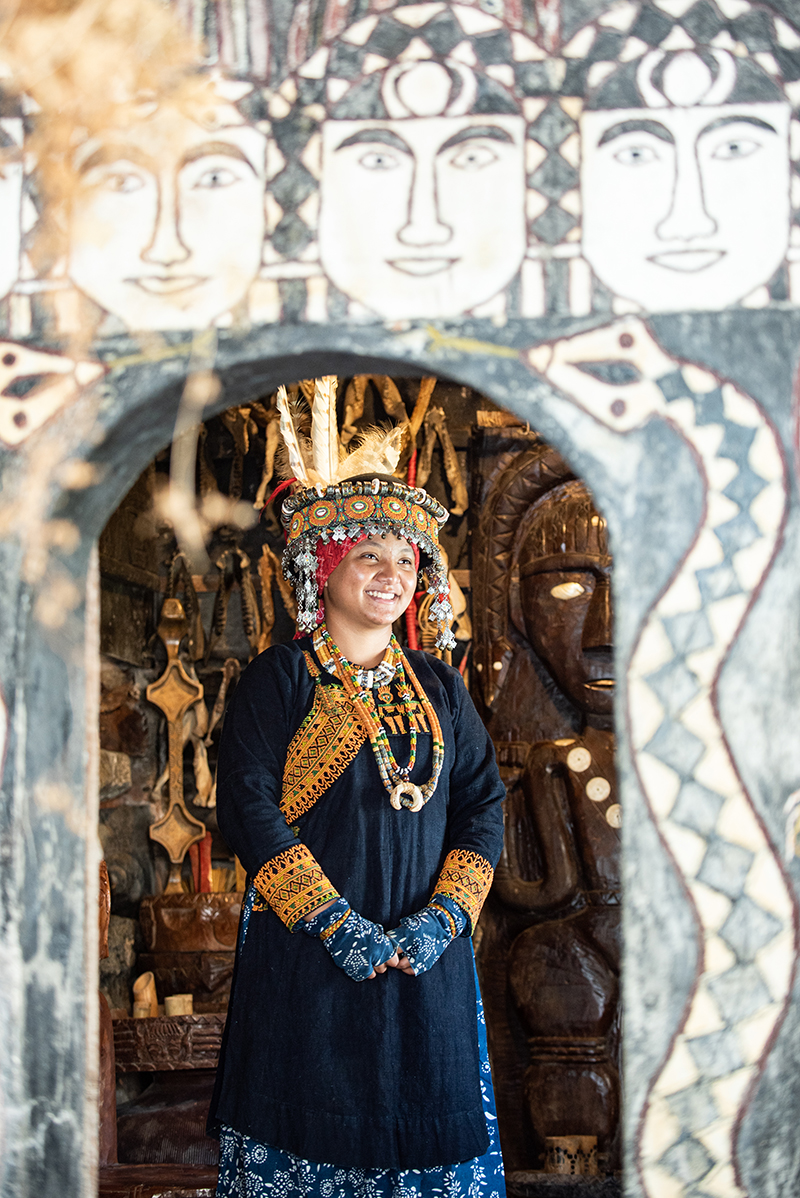
Destined to Become a Pulingau
Due to her parents' divorce, Muakayi was raised by her maternal grandparents from an early age. However, as they were often away to Taipei to the see doctor, Muakayi grew particularly close to her grand vuvu (grand granny), who also used to lead the community and had watched her growing up. As she could remember, her vuvu was pretty quiet. When being challenged by community members, though, she always kept calm and communicated with patience to avoid disrupting the harmony. This made her a widely trusted and respected elder in the community and an idol of Muakayi.
However, Muakayi’s vuvu had always regretted not being able to serve as a pulingau because of her leadership position. This is because by tradition, the position of pulingau, which is hereditary and limited to the female, cannot be held concurrently by the community leader. Such was the case with both Muakayi’s grandmother and vuvu. A leader’s family without a pulingau is like a monarch without a prime minister. Hence, it became her vuvu’s longtime worry that there could be no more pulingaus in the family.
“When vuvu was alive, she used to take me to watch traditional rituals, and I could feel her sense of loss…” recalls Muakayi. At those rituals, all were elders except for her and her older brother. They were left unattended while the adults were busy. Upon hearing of Muakayi’s childish dream to become a pulingau, her vuvu would always say, “You’ll push yourself to learn about it if that’s your fate.”
It turned out that Vuvu was right. Muakayi’s fate proved unstoppable. When she was in middle school, she had a dream one day. In the dream, she saw her vuvu, who had been bedridden from a stroke, walk into her room and open the ceiling, from which she took out a black bead and handed it to her. The next day, Muakayi told her family about the dream, and all were shocked, because the Paiwan legend has it that when a woman dreams of receiving the zaqu (“holy bead”), she is considered chosen by the ancestral spirits to be a candidate for the pulingau.
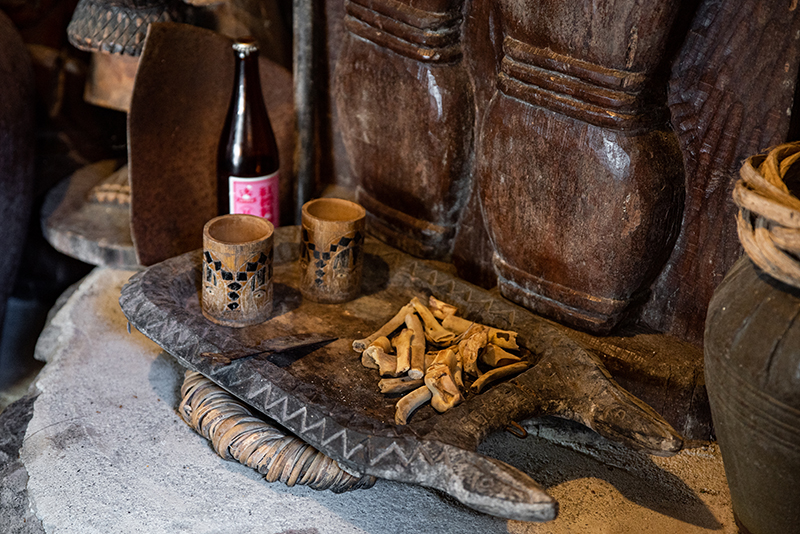
Working Hard to Prove Her Ability
From then on, Muakayi has become an apprentice to her grandaunt, who is a qualified pulingau, learning relevant knowledge in her spare time after school. She told us that there are numerous things to learn to become a pulingau. In addition to learning all the myths and legends of the community, memorizing the scriptures, she has to familiarize herself with the features, images, and duties of the various spirits. Besides, she also needs to acquire a good knowledge of local geography and directions.
“The most difficult part is language,” she says with a wry smile. Although she can speak some Paiwan, the scriptures are mostly written in the ancient form, which is rarely used today and therefore particularly hard to learn. She even does not dare to imagine that she will have to chant these scriptures for one or two hours in real rituals.
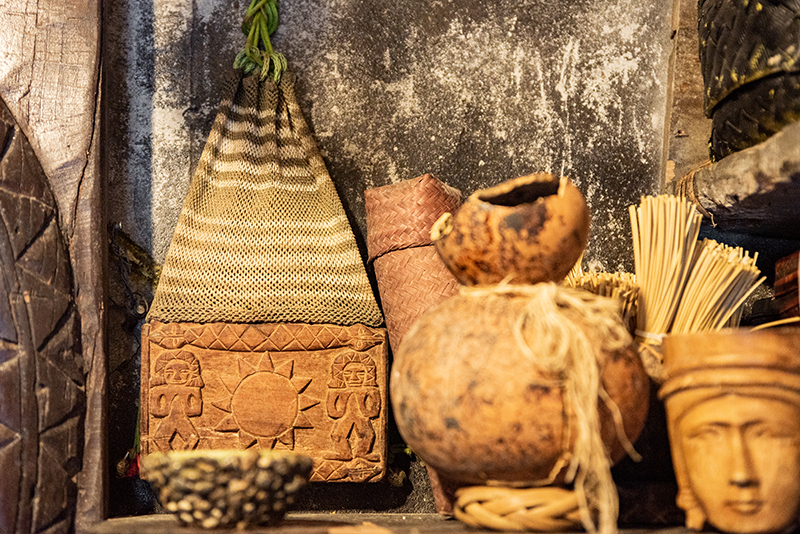
Since there has never been such a young pulingau before, Muakayi is inevitably subject to the doubts of other community members. “They wonder if I can make it at such a young age,” she says lightly. In modern society, due to the change in the public attitude, not every household would follow the tradition to encourage girls to be trained as pulingas at an early age. Therefore, nowadays, most Paiwan pulingaus do not take up the position until their thirties or forties, even fifties. In light of this, to prove her resolution and ability, Muakayi decides that she has to work even harder. While her peers are busy having fun and enjoying their youth, she chooses to stay home to memorize the abstruse scriptures. Sometimes she even has to squeeze out time to learn Paiwan from her grandfather. Her aim is to get familiar with the skills as quickly as possible to prove her competence.
In May 2019, Muakayi passed the liminqedjelj (“promotion ritual”) and was officially promoted as a pulingau. She could never forget how nervous she was while waiting for long for the zaqu to be dropped from above. She even burst into tears, fearing that she wasn’t the chosen one and that her family would thus be disgraced. In the end, the episode proved to be a coincidence. She was told by the elder who officiated the liminqedjelj that by tradition, the ceremony could not be attended by twins. On the day of her promotion, however, there were outsiders in the audience that violated the taboo unwittingly. That was why it took so long for the zaqu to appear.
It was at the liminqedjelj ceremony that Muakayi gained her first experience of divine possession. In one of the steps, to demonstrate her determination and perseverance, she had to get down on her knees and elbows and crawl in a figure-of-eight direction through the bamboo basket. At first, she felt only the physical pain and then lost consciousness quickly. It turned out that the fainting was a sign of possession by the shaman god, signifying its approval for her to become a pulingau. Then, the elder mimicked a bird chirping by her ears to wake her up. As she came to herself, her new life as a pulingau has begun.
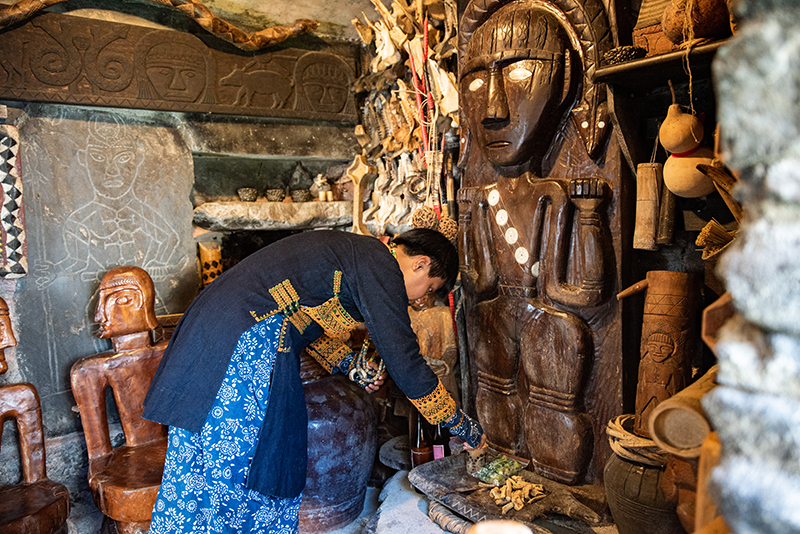
Dedicated to the Family
As she talks, Muakayi shows uncharacteristic maturity for a 19-year-old girl. Each of her major life decisions is centered around her family. Her sense of mission for the community was indirectly inspired by her granduncle Djaikung Luveljeng, the famous doctor who has long been working to establish the South Link Hospital in Taitung to provide medical care for people living in remote areas. His involvement in the community affairs influenced Muakayi’s decision to take the path of the pulingau. Muakayi has once attended a nursing school before but quit the program because of the family’s financial difficulties. She then turned to join the military, where she can earn a steady income.
Yet, with a limited number of leave days in the military, Muakayi finds it hard to strike a balance between her job and community affairs. Take this year’s masalut ritual for example. She failed to come back because she could not schedule a vacation, which made her very guilty. She understands, though, that as a modern Paiwan pulingau, she is inevitably challenged by how to perfect her professionalism as a pulingau. Equally important is that she has to ponder how to support herself when the community members no longer provide for her one day. She has even decided to remain unmarried throughout her life as long as needed by her family.
